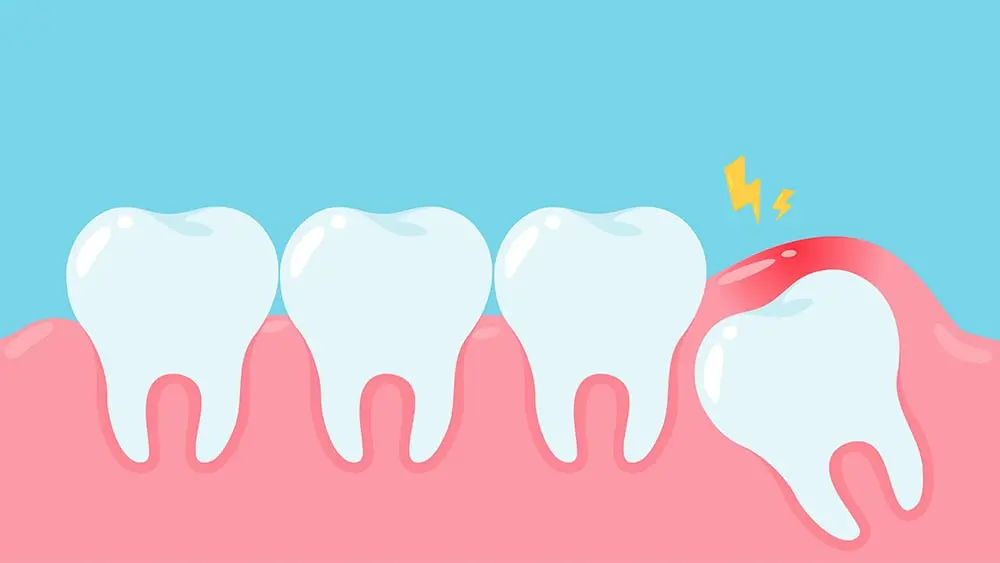Wisdom teeth are teeth that grow behind your molar teeth on the top and the bottom of your mouth. They are the last adult teeth that erupt in the mouth, usually between the ages of 17 and 25 years old.⁵ Wisdom teeth can often grow in a misaligned or crooked manner, causing problems to other teeth as they grow. Therefore, they're commonly known as impacted wisdom teeth.¹
What are impacted wisdom teeth?
Impacted wisdom teeth are third molars that grow at the back of the mouth but don't have enough space to emerge normally. They can result in damage to other teeth, pain and other dental problems as well. It's also harder to reach and clean impacted wisdom teeth which leaves them more susceptible to tooth decay than other teeth.² In some cases, however, impacted wisdom teeth don't cause any immediate or apparent damage to the mouth. Usually, impacted wisdom teeth that cause dental complications and pain are removed. Even impacted wisdom teeth that don't cause any immediate problems are sometimes removed to prevent future issues.²
What's the purpose of wisdom teeth?
Dental professionals commonly recommend wisdom teeth extraction because we don't really need them. An infected wisdom tooth can cause a great deal of pain, damage and trouble to the person. Anthropologists believe that they are an evolutionary relic that was one time helpful to distant human ancestors. Our ancestors' early diet mainly consisted of rougher foods like meats, nuts and roots that required more chewing than our diets today.³ The general consensus is that their teeth wore down and fell out often, in which case wisdom teeth grew as a replacement.
Wisdom teeth symptoms
Some people can have their wisdom teeth emerge without facing any problems. They line up with the other teeth and grow behind the second molars without causing misalignment. However, in many cases, the mouth is too crowded for the new wisdom teeth to develop normally, so they become trapped or impacted.
Here are some of the most common signs that your wisdom teeth are erupting and that the teeth may impact them.
Tender or bleeding gums.
Red or swollen gums.
Experiencing an unpleasant taste or bad breath.
Jaw pain.
Difficulty opening your mouth.
Swelling around the jaw.
Headaches due to the build-up pressure of impacted teeth.
Gum infections.²
Many people notice that the first signs of wisdom teeth growing is tenderness and discomfort at the back of their mouth. Impacted wisdom teeth can also leave the gum tissue susceptible to infection when only a part of the tooth emerges, leaving an opening where food can get stuck. It's best to see your dentist if you experience distressing symptoms that may be associated with having an impacted wisdom tooth.
Impacted wisdom teeth complications
In some cases, the impacted wisdom tooth emerges partially, with some of the crown only visible. This case is known as partially impacted wisdom teeth. While in other people, the wisdom tooth never breaks through the gums, in which case it's referred to as a fully impacted tooth. Here are some of the ways an impacted tooth can grow:
At an angle toward the second molar
Straight up or down but remain trapped within the jawbone
At an angle toward the back of the mouth
At a right angle to the other teeth, appearing to be lying down
Some of the complications that impacted wisdom teeth can lead to include damaging other teeth by pushing against the second molar. This increases the risk of infection in addition to many other problems by crowding the other teeth. Impacted wisdom teeth can also lead to cysts that can damage teeth, nerves and the jawbone.²
Moreover, partially impacted wisdom teeth are at a higher risk of tooth decay because they're harder to clean. It's also advisable to use mouthwash when impacted wisdom teeth grow to get rid of food or bacteria that gets trapped between the gum and the wisdom tooth.¹ Rinsing with an anti-bacterial mouthwash will also help decrease the risk of developing pericoronitis, an inflammatory gum condition.
Why keeping wisdom teeth clean take diligent effort?
You can't brush and floss your wisdom teeth the same way you do the rest of your teeth.⁶ Because of their location and position in the gum tissue, these teeth are prone to:
Impacted food
Gum disease and periodontal pocket formation
Bone loss
Abscesses
Impacted or partially erupted teeth⁶
Even with perfect brushing and flossing, wisdom teeth can be hard to reach and this can make it vulnerable to conditions such as gum disease, cavities, teeth abscess etc. When it comes to maintaining the wisdom tooth or the tissues around it healthy, traditional brushing and flossing aren't always enough.⁶ This is due to the fact that bacteria and food particles frequently make their way beneath the gum tissues, where brushing and flossing do not reach.⁶ You are more likely to develop cavities around your wisdom teeth if you have poor dental hygiene or use tobacco products.
How to clean around your wisdom teeth?
Cleaning around your third molars is possible, but it requires more dental hygiene tools than some people use on a daily basis. Brushing along the gumlines is vital for both stimulating the tissues and removing soft debris that collects at the gum line.⁷ Plaque formation can also be prevented by flossing below the gumlines on both sides of the tooth.⁷ Unfortunately, when gum pockets are present or the tooth is barely half erupted, these treatments are still restricted.
Using an antibacterial mouth rinse can assist to target bacteria in areas that flossing may not reach.⁸ Listerine mouthwash inhibits the growth of odorous bacteria in places of the mouth where dental hygiene is more difficult, such as the wisdom teeth.
Regular check ups and dental cleaning with your dentist is essential in keeping your wisdom teeth healthy. People who get fewer routine dental cleanings are more likely to have diseased third molars, which may require extraction later.⁴
Sources:
